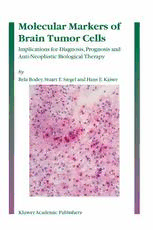
Molecular Markers of Brain Tumor Cells: Implications for Diagnosis, Prognosis and Anti-Neoplastic Biological Therapy PDF
Preview Molecular Markers of Brain Tumor Cells: Implications for Diagnosis, Prognosis and Anti-Neoplastic Biological Therapy
MOLECULAR MARKERS OF BRAIN TUMOR CELLS Molecular Markers of Brain Tumor Cells Implications for Diagnosis, Prognosis and Anti-Neoplastic Biological Therapy by Bela Bodey Department of Pathology and Laboratory Medicine, Keck School of Medicine, University of Southern California, Los Angeles & Childrens Center for Cancer and Blood Diseases, Childrens Hospital Los Angeles, Los Angeles, CA, U.S.A. Stuart E. Siegel Department of Pediatrics, Keck School of Medicine, University of Southern California, Los Angeles & Childrens Center for Cancer and Blood Diseases, Childrens Hospital Los Angeles, Los Angeles, CA, U.S.A. and Hans E. Kaiser Department of Pathology, School of Medicine, University of Maryland, Baltimore, MD, U.S.A. & Department of Clinical Pathology, University of Vienna, Vienna, Austria KLUWER ACADEMIC PUBLISHERS NEW YORK,BOSTON, DORDRECHT, LONDON, MOSCOW eBookISBN: 1-4020-2804-0 Print ISBN: 1-4020-2781-8 ©2005 Springer Science + Business Media, Inc. Print ©2004 Kluwer Academic Publishers Dordrecht All rights reserved No part of this eBook maybe reproducedor transmitted inanyform or byanymeans,electronic, mechanical, recording, or otherwise, without written consent from the Publisher Created in the United States of America Visit Springer's eBookstore at: http://ebooks.springerlink.com and the Springer Global Website Online at: http://www.springeronline.com TABLE OF CONTENTS Contributors ix Acknowledgements xi Preface xiii Growth Factors in Mammalian Embryogenesis and Neoplastic Transformation xv I. MOLECULAR BIOLOGY OF TUMORS. 1. Brain Tumors 3 1. Introduction 3 2. Medulloblastoma 3 3. Glial Tumors 7 2. Immunophenotypic Characterization of Infiltrating Poly- and Mononuclear Cells in Childhood Brain Tumors 13 1. Introduction 13 2. The Significance of Immunohistochemistry 20 3. Original Immunohistochemical Observations 33 4. Intermediate filaments (IFs) 37 5. Expression of Homeobox B3, B4, and C6 Gene Products 46 6. Cell proliferation 58 7. Epidermal growth factor (EGF) and its receptor (EGFR) 66 8. p53, the guardian of the integrity of the genome 71 vi 9. Apoptosis in Brain Tumors 77 10. Survivin 97 11. Tumor-related Neoangiogenesis in Childhood Brain Tumors 100 12. Presence of Matrix Metalloproteinases (MMPs) 108 13. The MAGE gene family 116 II. ANTI-NEOPLASTIC BIOLOGICAL THERAPIES 163 3. Experimental Therapies in Brain Tumors 169 4. Biologic Anti-Neoplastic Therapies 173 1. Introduction 173 2. Active nonspecific immunomodulation of natural immunity 177 3. Thymic hormones 180 4. Interferons: basic and preclinical studies 186 5. Tumor Necrosis Factors 193 6. The discovery of interleukin-2: basic principles 203 5. The lymphokine activated killer (LAK) cell phenomenon 227 1. Administration of rIL-2 and LAK cells: preclinical trials 229 6. Angiogenesis Inhibition in Anti-Neoplastic Therapy 233 7. Antigen Presentation by Dendritic Cells and Their Significance in Anti-Neoplastic Immunotherapy 239 1. Active antigen specific immunotherapy (tumor vaccines) 239 2. Antigen Presentation within Childhood Brain Tumors 245 3. Immunosuppression within the Cellular Microenvironment of Childhood Brain Tumors 245 4. The Dendritic Cell Network 246 5. Antigen Presentation by DCs 254 6. The Significance of DCs in Anti-Neoplastic Immunotherapy 258 Table of Contents vii 8. Genetically Engineered Antibodies for Direct Anti- Neoplastic Treatment and Systematic Delivery of Various Therapeutic Agents to Cancer Cells 285 1. Introduction 285 2. Human Cancer Cell Related Antigens 286 3. Oncogenes and Growth Factors in Neoplastic Cells 286 4. Antibodies and Neoplastic Cells 287 5. Anti-neoplastic Immunotherapeutical Regiments Influenced by Immunohistochemistry 290 6. Human Antibodies 292 7. Anti-Idiotypic Antibodies 293 8. Bispecific Antibodies 294 9. Radiolabeled Antibodies 296 10. Construction of Immunotoxins 298 11. Monoclonal Antibodies: Carriers of Drugs, Toxins and Cytotoxic Cells 299 12. Clinical Trials with Monoclonal Antibodies and their Minimal Toxicity 301 9. Cancer-Testis Antigens: Promising Targets for Antigen Directed Anti-neoplastic Immunotherapy 317 1. Introduction 317 2. Cancer/Testis Antigens 318 3. Detection of Cancer/Testis Antigens in Various Malignant Neoplasms and their Therapeutic Significance 321 Prologue 333 III. APPENDIX 339 10. Materials and Methods 341 1. Tissues and Tissue Handling 341 2. Libraries of Antibodies 344 3. Antigen Retrieval Technique 347 4. Immunoalkaline Phosphatase Antigen Detection Technique 347 5. Immunoperoxidase Antigen Detection Technique 348 6. Controls in Immunocytochemistry 349 7. Evaluation of the Immunoreactivity (immunostaining) 349 8. Tissue Processing for Tissue Culture Experiments 350 viii 9. Preparation of Thymic, Peripheral Blood and Bone Marrow Cell Suspensions 350 10. Isolation of Cortical Thymocytes 350 11. Isolation of Thymic Nurse Cells (TNCs) 351 12. Thymic Stromal Cell (RE & DC) Cultures 352 13. Proliferation Assay (PA) for Thymocytes and Peripheral Blood Hematopoietic Cells 353 14. Transmission Electronmicroscopy (TEM) of Cultured Thymic Medullary Cells (RE, DC, including LC, & IDC) and Macrophages 353 15. Scanning Electronmicroscopic (SEM) Procedure for Tissue Samples 354 11. Index 357 CONTRIBUTORS Professor Bela Bodey, M.D., D.Sc. Department of Pathology and Laboratory Medicine, Keck School of Medicine, University of Southern California, Los Angeles, & Childrens Center for Cancer and Blood Diseases, Childrens Hospital Los Angeles, Los Angeles, CA, USA Professor Stuart E. Siegel, M.D. Department of Pediatrics, Keck School of Medicine, University of Southern California, Los Angeles, & Childrens Center for Cancer and Blood Diseases, Childrens Hospital Los Angeles, Los Angeles, CA, USA. Professor Hans E. Kaiser, D.Sc. Department of Pathology, School of Medicine, University of Maryland, Baltimore, MD, USA & Department of Clinical Pathology, University of Vienna, Vienna, Austria. ACKNOWLEDGMENTS We would like to dedicate this book to Dr. Bodey’s wife, Dr. Victoria Psenko, who provided the ideal, conducive environment necessary for Dr. Bodey to pursue his research endeavors. We would like to acknowledge both of Dr. Bodey’s children, Vivian Bodey and Bela Bodey Jr., for their technical assistance through the years in the laboratory and for their assistance in preparing this book.
